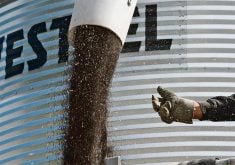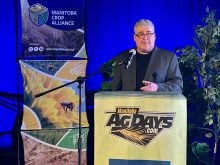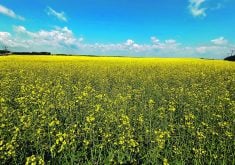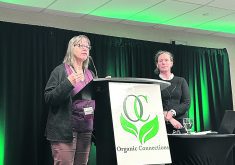SASKATOON — Canada’s canola growers have regained access to what was once a significant market.
Pakistan is reopening its doors after three years of shutting out canola and other genetically modified crops.
“It’s very good that market access has been re-established to Pakistan, for sure,” said Canola Council of Canada president Chris Davison.
Read Also

New World screwworm not seen as trade threat
Canadian cattle producers shouldn’t be worried about the New World screwworm, which has become a massive concern for ranchers in Mexico and is threatening the southern United States
Why it Matters: Canada needs new markets to offset the loss of the Chinese market.
“It certainly has been a significant market for Canadian canola seed.”
Dean Roberts, chair of the Saskatchewan Canola Development Commission, said it is a refreshing development.
“Right now, any good news is welcome on the farm,” he said.
“Given the year we’ve had of bad news story after bad news story, any positive news at this moment helps me feel (better) about next year’s crop.”
Pakistan has purchased as much as 1.35 million tonnes of Canadian canola in a given year. Annual imports averaged 810,000 tonnes between 2015 and 2020.
However, in late 2022, Pakistan’s Department of Plant Protection began requiring import licenses to support the arrival of GM crops.
The problem was the country had no system for receiving and processing import licenses at that time, so the National Biosafety Committee started developing regulations.
In late 2023, Pakistan’s federal cabinet approved amendments to its biosafety rules to support the import of GM crops for food, feed and processing.
The government put out a notification of implementation in January 2024. The registration process was initiated shortly after that.
The Canadian government worked with officials in Pakistan to provide the relevant information for Canadian GM canola events.
Those events were recently approved, paving the way for the issuance of import licenses to Pakistani importers wanting to bring in Canadian seed.
“It wasn’t a short process,” said Davison.
“There were a number of twists and turns that impacted timelines.”
The council has heard “expressions of interest” from Pakistani importers that will hopefully lead to requests and issuance of import licenses.
Renewed demand from Pakistan couldn’t happen at a better time because Canada is shut out of the Chinese market, which bought 5.86 million tonnes of seed in 2024.
Davison said it is too early to tell how much of that former Chinese demand will be absorbed by Pakistan.
“We’re going to watch to see if there’s an opportunity to re-establish trade at previous levels,” he said.
The council is also keeping a watchful eye on Mexico, the European Union and Japan.
“We do anticipate an increase in some of those markets,” said Davison.
Japan used to buy more than two million tonnes of Canadian canola per year, but in recent years it has been purchasing half that amount.
Davison said there will be opportunities in other markets now that Australia and others will be servicing Chinese demand.
Roberts said anything that helps offset the loss of the Chinese market is a welcome development because margins on the farm are getting squeezed.
“As commodity prices came down, fertilizer prices didn’t really follow,” he said.
Roberts had a decent canola crop on his farm near Coleville, Sask., but he has friends who did not and who are facing low commodity prices and high fertilizer costs.
“They’re in a very bad spot going into next year’s crop,” he said.
















